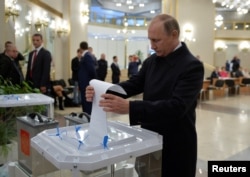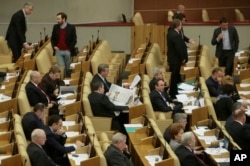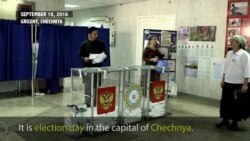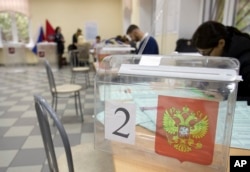Early election results show Russia's ruling party has won Sunday's parliamentary election, amid reports of election violations and visible voter apathy in the country's two largest cities.
With nearly all votes counted, President Vladimir Putin’s United Russia Party has more than 54 percent of the vote, with the Liberal Democrat Party and the Communists trailing with about 13 percent each, and A Just Russia with 6 percent.
The chief of the Russian Election Commission, Ella Pamfilova, said in a televised briefing that she sees no reason to nullify results in any location in the country, despite reports of election fraud.
Pamfilova conceded, however, that the election “was not sterile,” adding that reports of ballot stuffing were confirmed in three polling stations.
As expected, the ruling United Russia Party will retain its absolute majority in Russia's lower house, State Duma.
United Russia, led by Prime Minister Dmitry Medvedev, a loyalist of President Putin, currently has 238 of 450 Duma seats and dominates the more than 80 regional parliaments. The party is likely to gain another 100 seats in the Duma.
The election for lawmakers comes 18 months ahead of the next presidential election.
The Organization for Security and Co-operation in Europe sent more than 400 observers to Russia to monitor the election, about double that of 2011 when the OSCE sent 215 to monitor the parliamentary poll.
Analysts have seen the voting as a likely referendum on Putin's expected 2018 run for re-election.
Putin and United Russia were riding a wave of nationalist support over Crimea and ongoing military actions, with state-run media ignoring critics or branding them as traitors.
Kremlin supporters have so far valued what is seen as tough leadership more than concerns about which direction that authority is taking Russia.
Half of parliament will be decided by people voting for individuals, with the other half drawn from party lists. The last parliament was elected on party lists alone.
The perceived fairness of the election could be a critical factor in whether protests arise following the voting. Massive demonstrations broke out in Moscow after the last Duma election in 2011, challenging authorities with their size and persistence.
Complaints of election violations already were increasing Sunday as voting was proceeding across a country with approximately 110 million registered voters and 11 time zones.
WATCH: Voting in Grozny, Chechnya
While casting his ballot, the leader of Russian opposition People's Freedom party or PARNAS Mikhail Kasyanov said he expected multiple cases of election fraud to be registered during the poll.
"This is not surprising although the authorities promised and swore it to be the most fair, the best election,” he said. “But it is not so, it is as we expected. Let's see what the level of fraud will be, I expect it to be high.”
The Interfax news agency quoted Ilya Shablinsky, a coordinator of observers for the presidential Council on Human Rights, saying that information about violations was coming constantly from various regions.
An election monitoring group, Golos, also said it was receiving complaints of violations. A video posted on YouTube appeared to show a poll worker in the southern Rostov region dropping multiple sheets of paper into a ballot box.










